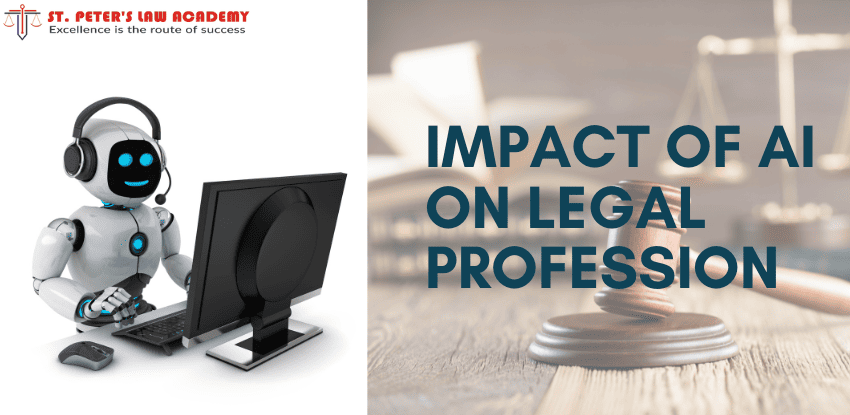+91 9990898327
Office : 632, Dr. Mukherjee Nagar, Delhi 110009
Mon-Sun: 09:00AM - 08:00PM

The era of Artificial Intelligence (AI) is overtaking every profession and industry. However, the use of AI in the legal sector in India is limited to the automation of routine tasks like contract review, legal research, and documentation. It has automated many time-consuming, routine tasks, allowing lawyers to focus on strategic tasks.
AI has strengthened productivity and reliability. It has overtaken administrative tasks like arranging meetings, appointments, document review, and application creation. AI is also extensively used for legal research. It can do research in seconds and provide accurate insights.
This blog explores the implications and effects of AI on legal practices. It attempts to answer the following questions-
Traditional legal research methods include visiting law libraries and browsing legal encyclopedias, indexes, and catalogs. They required extensive reading, consumed a lot of time, and the accuracy depended on the lawyer’s research skills.
The most significant disruption caused by AI is by AI-powered legal research tools. These tools help lawyers get deep insights in seconds.
1. Speed and efficiency
Traditional research requires a significant amount of hours, which AI can do within seconds.
2. Access to vast amounts of data
AI and Machine Learning analyze cases and trends and predict results in similar situations.
3. Enhanced accuracy and reliability
AI enhances the accuracy and reliability of case analysis by providing thorough and precise insights.
Here are a few popular AI legal research platforms-
AI can handle routine legal tasks like documentation, contract review, legal research, and data analysis. Larger firms have the means to set up AI systems, and this leads to an increase in effectiveness and efficiency.
With the automation of routine tasks, lawyers can save time and focus on other important matters.
AI is being used to review contracts quickly and consistently and can spot issues and errors that human lawyers have made.
With the automation of routine tasks, law firms' billable hours are decreasing, which is cost-effective for clients.
AI has increased the efficiency and productivity of lawyers. However, the legal profession is driven by analysis, decision-making, and courtroom representation, which AI cannot perform. AI is making clerical tasks and research easier, but it cannot replace lawyers.
The lack of explanation and transparency raises questions regarding the trustworthiness of automated decision-making. Without proper explanation, humans are left confused about how the decision was made, which can lead to potential concerns about bias.
Predictive Analysis is the process of using data to predict future events, trends, and results. Historical legal data like case documents, court decisions, and legal precedents are used to predict future outcomes.
AI-driven predictive analytics is used to anticipate court decisions. This helps lawyers examine the chances of success in litigation and make decisions on whether to pursue a case.
AI-driven predictive analytics can utilize case details and judicial data to forecast the outcome and settlement values. This helps assess legal risk and make informed litigation strategies.
AI relies on a large amount of data to learn and make predictions. The data generally includes sensitive information.
Several countries have introduced regulatory frameworks and guidelines governing AI, like the European Union's General Data Protection Regulation (GDPR). Canada and the US are exploring regulatory frameworks to address ethical concerns. India lacks a dedicated regulation for AI but has established a series of initiatives and guidelines regulating the development and deployment of AI.
AI systems do not have to get a license to practice law and, therefore, are not subject to ethical standards and codes of conduct. If the AI system provides inaccurate legal advice, it will become difficult to hold somebody liable for the mistake.
AI would innovate the way clients are serviced. The billable hour method would become obsolete, and law firms would need a pricing model based on the achievement of targets by the firm.
AI might also be used to hire legal professionals.
One of the biggest challenges is bias in AI algorithms, which can compound the existing disparities in the legal system. If AI systems are trained on biased data or programmed with inaccurate algorithms, then AI might discriminate against certain groups.
AI is a powerful tool that can enhance a lawyer’s capabilities. The adoption of AI opens the door to a more efficient and accessible legal system. Successful integration of AI requires a balance between the use of technology and human capabilities.
AI leverages machine learning, natural language processing, and other technologies to assist lawyers in their routine tasks. They perform routine tasks efficiently, analyze extensive data, and provide valuable insights.
AI cannot replace legal professionals; it can only increase their productivity. AI integration poses a few challenges, such as data security, overreliance on technology, and moral questions. Overcoming these challenges is essential for a fruitful integration.
AI legal research tools can go through large amounts of data, cases, and regulations in seconds and can provide valuable insights. This saves time, helps identify trends, and facilitates decision-making.
Such AI models should be developed to provide explainable results. The model should clearly explain the decision, and legal professionals should evaluate the reliability of the AI-driven decision.
Smith.ai, Casetext, Lex Machina, Lawgeex, ChatGPT Pro, Lawbotpro, and LawchatGPT are some commonly used AI tools in legal practice.
Law schools can introduce courses on AI, covering basic AI principles and machine learning. They can also provide practical training on AI tools.
Post a comment